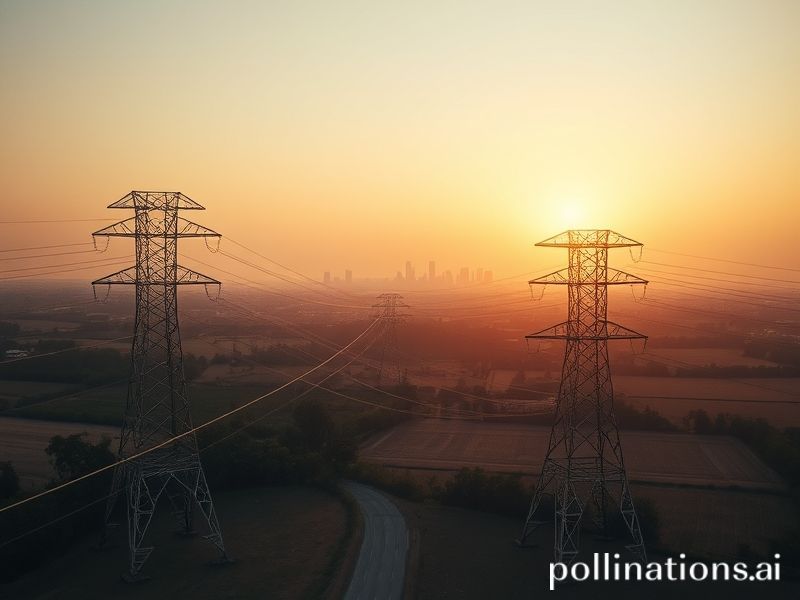National Grid: The World’s Unsexy Lifeline Flickering Under Global Pressure
National Grid: The World’s Least-Sexy Lifeline, Now Starring in Every Country’s Horror Show
By Our Correspondent, still recovering from a candle-lit Zoom call with the Moldovan energy minister
LONDON—If you squint at night satellite photos, the planet looks like a teenager’s phone screen: cracked, dimming in patches, and inexplicably on fire in others. Those twinkling veins of light are national grids, humanity’s shared circulatory system, pumping electrons instead of blood. They are also the one-night-stand nobody brags about: essential, taken for granted, and prone to catastrophic failure the moment you need them most.
From Texas to Tasmania, the story is the same. We build civilization atop a spiderweb we refuse to dust. Then we act shocked when it snaps in a stiff breeze, or a heatwave, or when a rogue balloon from a mid-tier superpower decides to audition for a Michael Bay sequel.
THE GLOBAL FRAYING, ABRIDGED
In Europe, the grid is a polyamorous arrangement: 39 countries swiping right on each other’s surplus electrons. Works great until Russia, the ex with the gas faucet, ghosts the chat. Cue Germany firing up coal plants like it’s 1953 and France debating whether 26 °C indoors constitutes “national suffering” or just “soft power yoga.”
Across the Sahel, solar mini-grids pop up faster than coup d’états, providing light just long enough for residents to read the evacuation notice. Meanwhile South Africa’s Eskom practices a scheduled religion called “load-shedding,” a euphemism for “we turn the lights off so the country doesn’t immolate.” Blackouts are staged with the precision of a Swiss train timetable, except the train is on fire and the tracks are theft.
China, ever the overachiever, has wrapped its provinces in an ultra-high-voltage spiderweb so efficient it can ship sunshine from Xinjiang to Shanghai faster than you can say “human-rights clause.” The catch: the carbon saved in Shanghai is emitted again when Beijing builds another steel plant to celebrate. Net-zero is apparently calculated the same way teenagers calculate “net calories after gym.”
India’s grid, a billion-person flash mob, performs the world’s largest coordination dance every evening. When 1.4 million people simultaneously switch on chai pots, operators hold their breath like bomb-disposal interns. Success means Bollywood stays lit; failure means a 2012 re-run and an impromptu population boom nine months later.
LATIN AMERICA’S VOLATILE TANGO
Brazil’s grid runs on water, which is adorable until the rainforest decides to boycott rain. Then the same country that torches forests for pasture suddenly prays for clouds to keep the A/C humming in São Paulo steak houses. In Chile, lithium-powered grids gleam green—if you ignore the Atacama deserts being flayed for battery juice so Berliners can store wind power in their basement Teslas.
THE INVISIBLE HAND, WEARING A RUBBER GLOVE
Markets, those infallible altars of human wisdom, now trade electricity like Pokémon cards. Traders in London buy Danish wind futures while Jakarta’s grid browns out—globalization at its most cathartic. When prices spike, aluminum smelters simply shut down, because nothing says “free market” like a factory taking the afternoon off to help your laptop stay alive.
CYBER HELL, POPULATION: EVERYONE
Ukraine’s grid has been hacked more times than a Nigerian prince’s email. The 2015 blackout proved that a few lines of code can dark-slide 230,000 citizens back to 1850 faster than you can say “have you tried turning it off and on again?” The Pentagon now trains utility crews like infantry; nothing boosts enlistment like telling a 19-year-old he can serve his country by updating Windows NT.
THE MORAL, BECAUSE EDITORS INSIST
National grids are the planetary equivalent of that friend who swears he’s “fine” while coughing up blood. They’re overworked, under-invested, and expected to soberly ferry us through climate change, geopolitical tantrums, and humanity’s refusal to pay retail for anything. Every government promises resilience, then auctions the copper wiring for campaign funds.
So next time you flip a switch and the room actually floods with light, take a moment to savor the miracle. Somewhere, a dispatcher just sacrificed three ibuprofen and a marriage to keep your Netflix binge alive. The grid may not be sexy, but neither is eating dinner by candlelight while explaining to your kids why the fridge is now a Petri dish. And in the grand, flickering tapestry of civilization, that counts as romance.







